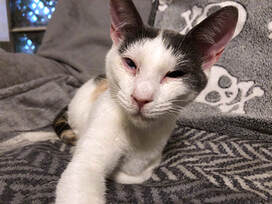
A common illness in cats, it’s similar to a cold but can be far more serious. Caused by either viruses or bacteria, it targets the upper airway -- the throat, nose and sinuses – rather than the lungs.
Although symptoms may differ depending on the cause and location of the infection, some of the most common ones include: sneezing, runny nose, cough, hoarseness, congestion, fever, drooling, gagging, clear to colored nasal and eye discharge, decreased appetite, oral and nasal ulcers, squinting or rubbing eyes, depression and lethargy.
Between 80 and 90 percent of upper respiratory infections are viral and the rest are usually caused by bacteria. Found in the tears, nasal secretions and saliva of infected cats, these viruses spread rapidly through direct contact such as touching and grooming or when ailing cats cough and sneeze on one another. The viruses can also live on the surfaces cats share -- food and water bowls and litter boxes -- while humans can spread the virus from cat to cat when their hands and/or clothing are contaminated.
Occurring most frequently in cats living in crowded conditions like shelters and breeding facilities, upper respiratory infections can just as easily affect cats living in multi-cat households. Other factors putting them at risk include:
· Age: Kittens and elderly cats are more likely than adult cats to become infected.
· Vaccination status: Annual vaccines can prevent them from getting sick or ensure that their infection is milder.
· Physical condition: Cats with feline leukemia (FeLV) or feline immunodeficiency virus (FIV) are more likely to get infections, while other illnesses or medications that suppress the immune system can also make cats more susceptible.
· Stress: This can not only make cats likelier to become infected in the first place but be re-infected when they’re older.
· Breed: Persians and other flat-faced breeds are more prone to infection because of their facial structure.
· Being outside: Outdoor cats and those who live both indoors and out are more likely to come in contact with infected cats.
If you suspect that your kitty has an upper respiratory infection, take her to the vet immediately. Not only can vets often tell what the problem is by looking at her and inquiring about her symptoms, they may also recommend certain tests such as:
· Blood tests. Combined with other lab work, these tests can rule out other causes for your cat’s symptoms – from dehydration to a possible electrolyte imbalance.
· Eye and/or mouth swabs. Such swabs enable your vet to grow a culture to determine which bacteria or virus is causing her infection.
· X-rays. If your cat suffers from recurring infections, a chest x-ray is the most accurate way to find out why. It can also help diagnose a possible fungal infection.
Once a clear diagnosis is made, the vet will decide on the most effective treatment for your cat. This may include medications, rest, isolation, IV fluids and nutritional support. And since cats often get a bacterial and a viral infection at the same time, should yours fall into this category, she may require antibiotics.
While your cat recovers in the familiar warmth and safety of her own home, consider these additional ways to help her feel better:
· Provide her with a comfortable and private place to rest.
· Encourage her to eat. Since cats with an upper respiratory infection lose some of their sense of smell, tempt her with the highest quality treats and food possible – ones with the fishiest odors.
· Gently clean any discharge from her eyes and nose.
· If her breathing is an issue, your vet may suggest placing her in the bathroom with a steamy shower running.
· But of utmost importance, use her prescribed medications precisely as directed.
Should your cat’s upper respiratory infection go untreated, it can often turn into pneumonia or have other serious complications such as chronic breathing problems and blindness.
To help prevent these infections in the first place:
· Keep your cat indoors to lower her risk of being exposed to infected animals.
· Ensure that any infected cat in a multi-cat household is properly isolated from your other cats.
· Minimize her stress level.
· Keep her up-to-date on vaccines as recommended by your vet, and although a vaccine for an upper respiratory infection may not prevent it, it can make one less severe.
· Since a cat’s best defense is a healthy immune system, regular vet examinations and preventive care can help catch and treat any problems early.
· Wash your hands thoroughly when handling multiple cats and, to err on the side of caution, consider changing your clothes afterwards.










 RSS Feed
RSS Feed